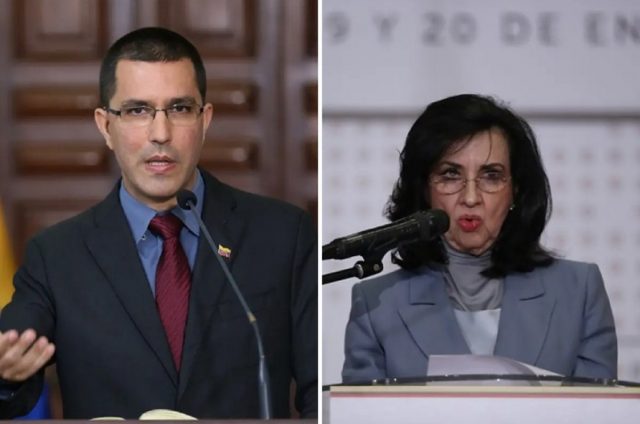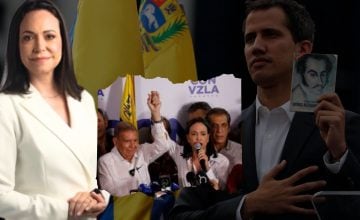Venezuela has tried, in different ways, to open channels of communication with Colombia to address the border conflict registered in the Venezuelan state of Apure, after Colombian armed irregular groups carried out attacks within the Venezuelan border. The efforts in Caracas have been unsuccessful, since they have only received refusals from the Uribe regime of Iván Duque.
This «outsourced conflict», as the Venezuelan Government has called it, has lasted for more than three weeks and has resulted in eight soldiers from the Bolivarian National Armed Forces (FANB) dead, nine ‘irregulars’ neutralized, more than 30 soldiers wounded, attacks with antipersonnel mines and anxiety in the population.
After this week, the Venezuelan Foreign Minister, Jorge Arreaza, said that he would request Mexico, which holds the pro tempore Presidency of the Community of Latin American and Caribbean States (Celac), to act as a mediator to dialogue with Bogotá and address the border situation; Colombian Foreign Minister Claudia Blum slammed the possibility of some rapprochement in an institutional message posted on the Colombian Foreign Ministry’s social networks, which was rejected by Caracas.
What has Colombia said after the attacks?
The Colombian Foreign Minister said in a video of just over a minute that the government of Nicolás Maduro is a «dictatorship» and accuses him of being an «accomplice» of the «drug trafficking and terrorist» groups that are supposedly sheltered in Venezuela, without Colombia having yet shown evidence.
So far, Duque’s only evidence to back up these claims was presented in 2019 during his speech at the 74th session of the UN General Assembly and it turned out to be false. The president showed a set of photos that indicated the presumed existence of guerrilla camps in Venezuelan lands with images that were taken in his own country.
The Foreign Minister, without delving into the measures that her Government has taken in the face of the situation on the porous border, where the presence of drug trafficking and paramilitary organizations from Colombia has also been denounced, rejected the actions of Caracas to repel the permanence of these groups in their territory.
«Recently, that dictatorship tries to show a fictitious image of fighting crime, but the world knows that the Maduro regime does not respect any legal framework», added Blum. In her opinion, the combat of irregular groups by the Venezuelan Army is a resource for Maduro to «divert international attention» from his «complicit relationship» with alleged guerrilla groups.
The senior official also ratified the Duque Administration’s position on «international diplomatic pressure to achieve the return of democracy» in the neighboring country. Bogotá still recognizes ex-congressman Juan Guaidó, self-proclaimed «interim president», as legitimate and supports measures to depose Maduro.
Given these statements, which seem to break again an opportunity for the reestablishment of talks between the two countries in the midst of a conflict scenario, the Foreign Minister of that country, Jorge Arreaza, described the government of Colombian President Iván Duque as «unbelievable», on his Twitter account, where he replied to his Colombian counterpart.
The highest representative of Venezuelan diplomacy wrote that «although the armed groups linked to drug trafficking are Colombian and attack Venezuela», that country sent a message to its foreign minister «to seek channels of dialogue» and she replied «with a primitive script, irresponsible and ideological».
This hard line from Colombia on the treatment of common issues for both countries was also expressed this week by Colombian Defense Minister Diego Molano, in a debate on political control held in the House of Representatives last Wednesday. Molano said that there are «five great symbols of evil» that the Colombian Public Force inherited from the peace agreement, citing among them the FARC dissidents who «today are hiding in Venezuela, disseminate videos with threats and seek to control its business from the border».
What measures has Venezuela taken?
Weeks after these confrontations that have put the border populations of both countries in suspense, the Operational Strategic Command (CEOFANB) of Venezuela reported that it had deployed rapid action troops throughout the Apure state to «combat irregular armed terrorist groups.»
The day before, the Venezuelan Defense Minister, Vladimir Padrino López, announced the activation of the ‘Special temporary integral defense operational zone‘ in three municipalities of the border state (José Antonio Páez, Muñoz and Rómulo Gallegos). This measure covers the 710 kilometers of the southern border line of Apure where the Venezuelan populations of El Nula, Guasdualito and La Victoria are located, which border the Colombian departments of Arauca and Vichada.
With regard to the security measures that were established in the area, the land, air and river transit routes were regulated in the three municipalities of the province and time restrictions were imposed for movement by any means, as well as for the use of the recreational spaces.
Along the same lines, the Administrative Service for Identification, Migration and Immigration (SAIME) will be in charge of carrying out migration controls in the border municipalities, for which it will require that information be reported on the change of address or residence in the designated area and the digital record of the fingerprints of those who leave or enter Venezuela.
The impossibility of dialogue between the two countries, which maintains a border of more than 2,000 kilometers with a lot of activity, despite the restrictions due to the coronavirus and the breakdown of diplomatic relations since 2019, is accompanied by mutual accusations. Caracas blames Bogotá for neglecting the security of its territory, which has led to the operation of these armed organizations in Venezuela and the recent attacks. For its part, the ‘Casa de Nariño’ holds ‘Miraflores’ responsible for harboring and allowing the permanence of the guerrilla members in order to prepare destabilizing plans against them.












